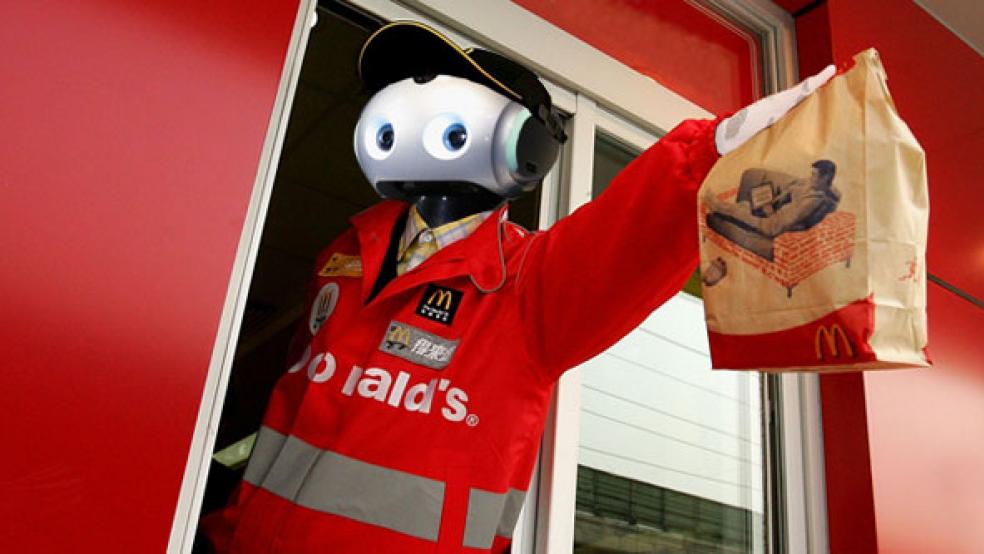Joining the workforce in the age of pizza-delivering drones and self-driving cars is easier said than done, especially for millennials. Available jobs are increasingly going to equally qualified applicants, the types that were once just a thing of Hollywood movies-- robots.
Consider the irony: Millennials are coming of age in a world where the one thing they understand better than any other generation—technology—may well be the thing that hurts them most of all.
Related: Good Jobs Report Leaves Many Millennials Out
It’s all part of what leading tech gurus say is an urgent need for society to transform the way it views jobs.
Google cofounder Larry Page, for example, says one antidote for high unemployment is to view employment differently; if people prefer not to work 24/7, “just reduce work time,” but don’t consider part time a negative.
The Google CEO’s work-less, do-better mentality was laid out in a Thursday interview with fellow Google pioneer Sergey Brin conducted by billionaire venture capitalist Vinod Khosla.
His take may seem counterintuitive, especially at a time when young people are still struggling to find work in the wake of the recession.
Related: The Rise of Robots and the Decline of Jobs is Here
The June jobs report, boasting an unemployment rate of 6.1 percent, shows positive signs of economic growth. But the snapshot is not as sunny for young adults. Those between the ages of 18 to 34 have an unemployment rate of 9 percent (higher if you count those who have given up looking) —which leaves many sitting around twiddling their thumbs.
Page acknowledges that people aren’t happy if they have too much idle time, saying that that most want to “feel like they are needed” and “have something productive to do.”
But he doesn’t believe the answer to that need is necessarily a job. At least, not a full time one. Recalling a recent discussion with Richard Branson, Page discussed the English business magnate’s solution to companies’ unwillingness to bring on new employees: hire two part-time workers instead of one full-time worker. Recognizing it would come at slightly higher costs to employers, Page argued that it would be beneficial for younger people just starting their careers. “At least the young people can have a half-time job rather than no job,” said Page.
As he sees it, it’s what people want—a healthy work-life balance. “Most people like working,” said Page, “but they would also like to have more time with their family or [time to pursue] their own interests.”
No surprise: Most people would like an extra week of vacation. “100 percent of people,” said Page. He challenges the idea that people need to work as much as they do, calling it a “societal problem,” and one that many don’t recognize as a problem.
Related: The New Playbook That Taps a $200 Billion Millennial Market
If you think making such a strong argument that part time work could be the equal to full time is out of the box thinking, well think again. Or think about the coming robot revolution.
“Eventually no human will have to work at all,” said Marshall Brain, founder of How Stuff Works and author of Robotic Nation. “Therefore, we should redesign our society so that everyone is on perpetual vacation.”
From parking lot attendees, to toll booth collectors, to drugstore cashiers, robotic automated machines are already freeing up more of people’s time.
They get the job done, and usually—they don’t talk back.
The question many fear, particularly millennials, is whether these robots will make the already challenging job search even more of a challenge. Brain says yes—absolutely, yes.
Related: We’re One Step Closer to Robots on the Battlefield
“Eventually, robots will equal and then surpass human capabilities,” said Brain in an interview, “and they will take a lot of jobs much sooner than we might expect.”
Brain, who admits he’s on the extreme side of the spectrum, makes a controversial and bold prediction: “Within a couple of decades, there won’t be a single job that robots can’t do better than humans.”
Robots haven’t just moved in on low-wage and entry-level jobs, but all the way up the chain to the likes of law clerks and doctors.
Robots are already helping the best and brightest do what they do even better. A surgical technology called Firefly elevates doctors’ ability to remove kidney tumors more safely and more efficiently at Georgetown University Hospital. An unmanned ground vehicle called MAARS (Modular Advanced Armed Robotic System) has been used to drag injured soldiers out of combat zones and monitor security in remote areas. A humanoid robot called Robonaut 2 aboard the International Space Station can perform simple tasks such as flipping switches and grabbing objects, relieving some of the challenging spacewalks required of astronauts.
Related: Robots Take Caregiving to a Whole New Level
But the breakthroughs haven’t come without the roadblocks. “Right now,” said Page, “we feel like computers are still pretty bad.”
Admitting that not all of Google’s attempts at technological advancement have been successful, Page pointed to Google’s ‘I’m Felling Lucky’ feature, which was intended to allow users to skip the search results and go straight to the answer. “Maybe you don’t want to ask questions, maybe you just want to have it answered before you ask it,” said Page. “That would be better.”
Brain predicts that the first true circuit breaker will be when robots can see, rather than think, like humans. “Computer science hasn’t figured out a solution to the general vision problem yet, but as soon as that gets figured out, it opens up this huge range of jobs for replacement that have been immune to replacement for a long time,” said Brain.
On that list: most remaining factory jobs, along with the fast food, retail and construction industries. “If we just take those sectors,” said Brain, “that’s tens of millions of jobs.”
Related: The Robot Reality—Service Jobs Are Next to Go
Take leading retailer Walmart, which currently employs over 2 million people. Many of those jobs entail helping customers check out, stocking the shelves, mopping the floors, and picking up carts from the parking lot. “We are close to being able to automate these things now,” says Brain. “But with a good vision system, it’s a no-brainer.”
According Brin, who leads the hush-hush R&D division known as Google X, cutting-edge machine learning is already capable of taking inputs such as vision—which is currently being used for Google’s self-driving cars.
Google recently acquired DeepMind Technologies, a London-based startup focusing on artificial intelligence research that seeks to achieve tasks such as recognizing words in human speech or faces in video. “In theory,” said Brin, “we hope it will one day be fully reasoning [artificial intelligence].”
Key word: hope.
Many dispute Brain’s claim that Robots can ever truly, well, have brains.
Related: The Robot Revolution Rips Up Our Social Contract
“Computer scientists have been promising that for decades and not at all delivered,” said Brin during Thursday’s discussion. “So I think it would be foolish for us to make prognoses about that.”
Although machine learning has never reached its speculated potential, Brin predicts it very well could down the road. “You should presume that some day we will be able to make machines that can reason and think and do things better than we can,” said Brin.
So, for now, millennials need not worry too much about a robot having a better resume, or seeing the problem more clearly. For now.
Top Reads from The Fiscal Times:





